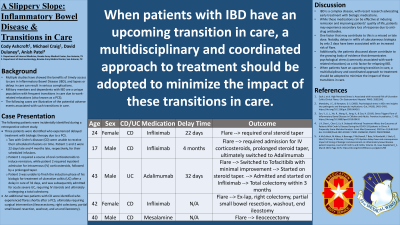Back


Poster Session A - Sunday Afternoon
Category: IBD
A0403 - A Slippery Slope: Inflammatory Bowel Disease and Transitions in Care
Sunday, October 23, 2022
5:00 PM – 7:00 PM ET
Location: Crown Ballroom

Has Audio
- CA
Cody Ashcroft, MD
Brooke Army Medical Center
Fort Sam Houston, TX
Presenting Author(s)
Award: Presidential Poster Award
Cody Ashcroft, MD1, Michael Craig, MD2, David Dulaney, MD1, Anish Patel, DO1
1Brooke Army Medical Center, Fort Sam Houston, TX; 2Brooke Army Medical Center, San Antonio, TX
Introduction: Multiple studies have showed the benefits of timely access to care in Inflammatory Bowel Disease (IBD), and lapses or delays in care can result in serious complications. Military members and dependents with IBD are a unique population with frequent transitions in care due to work-related relocations (also known as a PCS) with the following cases being illustrative of the potential adverse events associated with such transitions in care.
Case Description/Methods: The following patients were incidentally identified during a retrospective cohort study. Three patients were identified who experienced delayed treatment with biologic therapy due to a PCS. Of these patients, two with Crohn’s disease (CD) were unable to receive their scheduled infusions on time. Patient 1 and 2 were 22 days late and 4 months late, respectively, for their scheduled infusions. Patient 1 required a course of oral corticosteroids to induce remission, while patient 2 required inpatient admission for intravenous (IV) corticosteroids, followed by a prolonged taper. Patient 3 was unable to finish the induction phase of his biologic for treatment of ulcerative colitis (UC) after a delay in care of 32 days, and was subsequently admitted for acute severe UC, requiring IV steroids and ultimately undergoing a total colectomy. An additional two patients with CD were identified who experienced flares shortly after a PCS, ultimately requiring surgical intervention (ileocecectomy; right colectomy, partial small bowel resection, washout, and an end ileostomy).
Discussion: IBD is a complex disease, with recent research advocating early treatment with biologic medications. While these medications can be effective at inducing remission and improving patients’ quality of life, patients may experience secondary loss of response due to anti-drug antibodies. One factor that may contribute to this is a missed or late dose. Notably, delays in refills of subcutaneous biologics by only 2 days have been associated with an increased risk of flare. Additionally, the patients discussed above contribute to the growing body of evidence that demonstrates psychological stress (commonly associated with work-related relocations) as a risk factor for relapsing IBD. When patients have an upcoming transition in care, a multidisciplinary and coordinated approach to treatment should be adopted to minimize the impact of these transitions in care.
Disclosures:
Cody Ashcroft, MD1, Michael Craig, MD2, David Dulaney, MD1, Anish Patel, DO1. A0403 - A Slippery Slope: Inflammatory Bowel Disease and Transitions in Care, ACG 2022 Annual Scientific Meeting Abstracts. Charlotte, NC: American College of Gastroenterology.
Cody Ashcroft, MD1, Michael Craig, MD2, David Dulaney, MD1, Anish Patel, DO1
1Brooke Army Medical Center, Fort Sam Houston, TX; 2Brooke Army Medical Center, San Antonio, TX
Introduction: Multiple studies have showed the benefits of timely access to care in Inflammatory Bowel Disease (IBD), and lapses or delays in care can result in serious complications. Military members and dependents with IBD are a unique population with frequent transitions in care due to work-related relocations (also known as a PCS) with the following cases being illustrative of the potential adverse events associated with such transitions in care.
Case Description/Methods: The following patients were incidentally identified during a retrospective cohort study. Three patients were identified who experienced delayed treatment with biologic therapy due to a PCS. Of these patients, two with Crohn’s disease (CD) were unable to receive their scheduled infusions on time. Patient 1 and 2 were 22 days late and 4 months late, respectively, for their scheduled infusions. Patient 1 required a course of oral corticosteroids to induce remission, while patient 2 required inpatient admission for intravenous (IV) corticosteroids, followed by a prolonged taper. Patient 3 was unable to finish the induction phase of his biologic for treatment of ulcerative colitis (UC) after a delay in care of 32 days, and was subsequently admitted for acute severe UC, requiring IV steroids and ultimately undergoing a total colectomy. An additional two patients with CD were identified who experienced flares shortly after a PCS, ultimately requiring surgical intervention (ileocecectomy; right colectomy, partial small bowel resection, washout, and an end ileostomy).
Discussion: IBD is a complex disease, with recent research advocating early treatment with biologic medications. While these medications can be effective at inducing remission and improving patients’ quality of life, patients may experience secondary loss of response due to anti-drug antibodies. One factor that may contribute to this is a missed or late dose. Notably, delays in refills of subcutaneous biologics by only 2 days have been associated with an increased risk of flare. Additionally, the patients discussed above contribute to the growing body of evidence that demonstrates psychological stress (commonly associated with work-related relocations) as a risk factor for relapsing IBD. When patients have an upcoming transition in care, a multidisciplinary and coordinated approach to treatment should be adopted to minimize the impact of these transitions in care.
Disclosures:
Cody Ashcroft indicated no relevant financial relationships.
Michael Craig indicated no relevant financial relationships.
David Dulaney indicated no relevant financial relationships.
Anish Patel indicated no relevant financial relationships.
Cody Ashcroft, MD1, Michael Craig, MD2, David Dulaney, MD1, Anish Patel, DO1. A0403 - A Slippery Slope: Inflammatory Bowel Disease and Transitions in Care, ACG 2022 Annual Scientific Meeting Abstracts. Charlotte, NC: American College of Gastroenterology.

